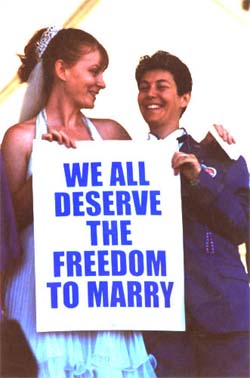
|
Cover Photo By: Dana Stuart Printed with kind permission of SF Pride
These are hardly our first legal victories - Deb Price and Joyce Murdoch's excellent book, Courting Justice, demonstrates several noteworthy successes. The American Psychiatric and Psychological Associations decided we were no longer "sick" in the mid-1970s, and most mainstream churches continue to struggle with our degree of sinfulness. But for our Supreme Court to overrule its decision a mere 17 years after Bowers v. Hardwick (in which the Court found that Georgian Michael Hardwick had no right to engage in consensual sex with another man) in deciding that the State of Texas unfairly restricted John Geddes Lawrence and Tyron Garner's right to engage in consensual sex is nothing short of extraordinary. (In historic contrast, it took nearly a century for the Supreme Court's 1857 Dred Scott v. Sanford and 1896 Plessy v. Ferguson decisions to be overturned by Brown v. Board of Education in 1954, belatedly affirming African-Americans' rights to participate as full citizens in American society.) The Court's 6-3 decision, penned by centrist Judge Anthony Kennedy (who writes in pertinent part, "Bowers was not correct when it was decided, and it is not correct today. … The Texas statute furthers no legitimate state interest which can justify its intrusion into the personal and private life of the individual"), and concurred separately by fellow centrist Sandra Day O'Connor (who sided with the anti-gay majority in Bowers) proves we now occupy the middle ground in America, further marginalizing our opponents. Tellingly, in dissent, Justice Antonin Scalia writes: "Today's opinion is the product of a Court … that has largely signed on to the so-called homosexual agenda …. It is clear from this that the Court has taken sides in the culture war …. Many Americans do not want persons who openly engage in homosexual conduct [participating in their daily lives.] They view this as protecting themselves and their families from a lifestyle that they believe to be immoral and destructive."
All of our visible efforts as a community over the last 30 years or so - from local gay pride parades and festivals to the Marches on Washington; from television to movie representations depicting our vast diversity; from our martyrs to our saints; from our response to AIDS to our creation of local and national organizations - have contributed to painting an accurate portrait of our community. As Holly Near sang, "We are a gentle, angry people." We are also a funny, silly, serious, political, stylish, loving, in-your-face, fabulous people - and mainstream, heterosexual, Middle America knows that now. But the conservatives' white flag of legal surrender conceals weapons of queer destruction. While celebrating victory, we must anticipate a backlash, as right-wingers witness one of their most precious prejudices de-fanged before them. As "they" have already begun constructing a Constitutional amendment to exclude recognition of gay marriages, we must remain (or become) active. Winning the culture war will not prove sufficient alone to gain us our full civil rights, including legal rights in relationship recognitions in every state, adoption, immigration, military service, domestic partner benefits, etc. Let us also recognize that our victory does not protect all members of our LGBT community (specifically, the "T"), and remain vigilant on their behalf as well. With newly-conferred rights come newly-developing responsibilities. While not all of us will be "model citizens" - nor do we all aspire to be - we must acknowledge our responsibilities and take them (if not ourselves) seriously. This does not mean that we should necessarily ape heterosexual culture; its models are not always (or only) appropriate for our community. But if northern North America now seems prepared to offer us equal civil rights, we must not squander them frivolously - for example, a "trick" is not a marriage, nor is raising a child a "trendy" fashion statement. Gay people must prepare to confront issues such as alimony and child visitation rights - when the law excluded us, and in the absence of accepted precedent, we could (and often did) walk away from our relationships, leaving destitute partners (or being so left). Americans preparing to trek northward to solemnize their marriages also must understand that any subsequent divorce will require a one-year residency requirement; two people should not undertake such a decision after a wild weekend simply because they now can. How will the next GLB(T) generation develop, knowing that their most personal sexual acts are no longer criminal in nature, and finding increased recognition and sanction of their relationships? This is the fruit of the labor of so many - to create a better life for those who follow us. I hope it will more closely resemble the raspberry than the grapefruit.  Paul D. Cain is the author of Leading the Parade: Conversations with America's Most Influential Lesbians and Gay Men, Scarecrow Press, 2002
Paul D. Cain is the author of Leading the Parade: Conversations with America's Most Influential Lesbians and Gay Men, Scarecrow Press, 2002
|
 Two men celebrate during San Francisco Pride 2003, which occured just days after the landmark Lawrence v. Texas decision
Two men celebrate during San Francisco Pride 2003, which occured just days after the landmark Lawrence v. Texas decision  A lesbian couple speaks out for marriage rights in the wake of the Supreme Court's reversal of the nation's sodomy laws
A lesbian couple speaks out for marriage rights in the wake of the Supreme Court's reversal of the nation's sodomy laws